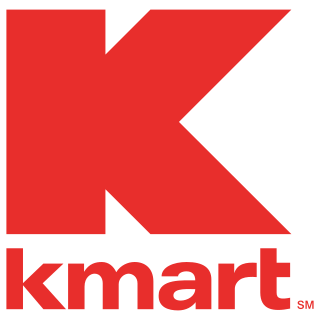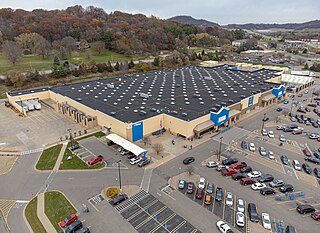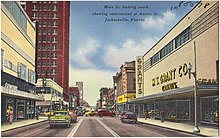
Borders Group, Inc. was an American multinational book and music retailer based in Ann Arbor, Michigan, United States. In its final year, the company employed about 19,500 people throughout the U.S., primarily in its Borders and Waldenbooks stores.

Kmart, formerly legally registered as Kmart Corporation, now operated by Transformco, is an online retailer in the United States and operates six remaining Kmart big-box department stores — 3 in the US Virgin Islands and one each in Kendale Lakes, Florida ; Bridgehampton, Long Island; and Tamuning, Guam.

Zellers was a Canadian discount store chain founded by Walter P. Zeller in 1931. It was acquired by the Hudson's Bay Company (HBC) in 1978, and after a series of acquisitions and expansions, peaked with 350 locations in 1999. However, fierce competition and an inability to adapt during the retail apocalypse resulted in Zellers losing significant ground in the 2000s.

Sears, Roebuck and Co., commonly known as Sears, is an American chain of department stores founded in 1892 by Richard Warren Sears and Alvah Curtis Roebuck and reincorporated in 1906 by Richard Sears and Julius Rosenwald, with what began as a mail ordering catalog company migrating to opening retail locations in 1925, the first in Chicago. In 2005, the company was bought by the management of the American big box discount chain Kmart, which upon completion of the merger, formed Sears Holdings. Through the 1980s, Sears was the largest retailer in the United States. In 2018, it was the 31st-largest. After several years of declining sales, Sears's parent company filed for Chapter 11 bankruptcy on October 15, 2018. It announced on January 16, 2019, that it had won its bankruptcy auction, and that a reduced number of 425 stores would remain open, including 223 Sears stores.

A variety store is a retail store that sells general merchandise, such as apparel, auto parts, dry goods, toys, hardware, furniture, and a selection of groceries. It usually sells them at discounted prices, sometimes at one or several fixed price points, such as one dollar, or historically, five and ten cents. Variety stores, as a category, are different from general merchandise superstores, hypermarkets, warehouse clubs, grocery stores, or department stores.
A discount store or discounter offers a retail format in which products are sold at prices that are in principle lower than an actual or supposed "full retail price". Discounters rely on bulk purchasing and efficient distribution to keep down costs.
Waldenbooks was an American shopping mall-based bookstore chain operated by the Walden Book Company, Inc., and from 1995 was a subsidiary of Borders Group. The chain also ran a video game and software chain under the name Waldensoftware, as well as a children's educational toy chain under Walden Kids. In 2011, the chain was liquidated in bankruptcy.

Caldor, Inc. was a discount department store chain founded in 1951 by husband and wife Carl and Dorothy Bennett. Referred to by many as "the Bloomingdale's of discounting," Caldor grew from a second story "Walk-Up-&-Save" operation in Port Chester, New York, into a regional retailing giant. Its stores were earning over $1 billion in sales by the time Carl Bennett retired in 1985, by which time Caldor was a subsidiary of Associated Dry Goods.

Building #19 was a New England chain of discount closeout retailers that operated from 1964 until it declared bankruptcy in 2013. At the time of its bankruptcy, it had thirteen stores. The family that owned the chain later reopened two of the former locations as a part of a new business, The Rug Department, that was limited to rugs and related merchandise. However, these locations in Norwood and Burlington closed in 2014.

McCrory Stores or J.G. McCrory's was a chain of five and dime stores in the United States based in York, Pennsylvania. The stores typically sold shoes, clothing, housewares, fabrics, penny candy, toys, cosmetics, and often included a lunch counter or snack bar. They also exclusively sold Oriole Records, one of the most popular 'dime store labels' from 1921 to 1938.

Zayre was a chain of discount stores that operated in the eastern half of the United States from 1956 to 1990. The company's headquarters were in Framingham, Massachusetts. In October 1988, Zayre's parent company, Zayre Corp., sold the stores to the competing Ames Department Stores, Inc. chain. In June 1989, Zayre Corp. merged with one of its subsidiaries, The TJX Companies, parent company of T.J. Maxx, which still exists today. A number of stores retained the Zayre name until 1990, by which time all stores were either closed or converted into Ames stores.

Kmart Australia Limited is an Australian chain of retail department stores owned by the Kmart Group division of Wesfarmers.

Giant Tiger Stores Limited is a Canadian discount store chain which operates over 260 stores across Canada. The company's stores operate under the Giant Tiger banner in Alberta, Manitoba, New Brunswick, Nova Scotia, Ontario, Prince Edward Island and Saskatchewan; under the GTExpress and Scott's Discount banners in Ontario and under the Tigre Géant banner in Quebec.
Gordon Reid was a Canadian businessman. He was the founder of Giant Tiger, Canada’s third-largest chain of discount stores.

A big-box store, a hyperstore, a supercenter, a superstore, or a megastore is a physically large retail establishment, usually part of a chain of stores. The term sometimes also refers, by extension, to the company that operates the store. The term "big-box" references the typical appearance of buildings occupied by such stores.
C.R. Anthony Co., stores branded as Anthony's, was a chain of family-owned and - operated upscale department stores founded in 1922 in Cushing, Oklahoma by C.R Anthony. The company began expanding outside Oklahoma, first into Kansas in 1924, then into Texas in 1925. By 1972, Anthony's had 325 stores in 21 states, all west of the Mississippi River. Anthony's was acquired by Stage Stores Inc. in 1997 and most stores were rebranded as Stage or Beall's.
Sears Holdings Corporation was an American holding company headquartered in Hoffman Estates, Illinois. It was the parent company of the chain stores Kmart and Sears and was founded after the former purchased the latter in 2005. It was the 20th-largest retailing company in the United States in 2015. It filed for Chapter 11 bankruptcy on October 15, 2018, and sold its assets to ESL Investments in 2019. The new owner moved Sears assets to its newly formed subsidiary Transform Holdco LLC and after that, Sears Holdings Corporation was closed.
National Record Mart, known as NRM for short, was an American music store chain. The first music store chain in the United States, it was founded in 1937 in Pittsburgh, Pennsylvania, and operated more than 130 locations at its peak. Other stores under its ownership included Oasis, Music X, Waves Music, and Vibes. The chain filed for bankruptcy in 2001 and closed the last of its stores in 2002.
Transform SR Brands LLC is an American privately held company formed on February 11, 2019, to acquire some of the assets of Sears Holdings Corporation. The new company is owned by ESL Investments. Following the Chapter 11 bankruptcy filing of Sears Holdings on October 15, 2018, Transformco purchased the surviving assets owned by Sears Holdings for $5.2 billion.

Globe Discount City and Globe Shopping City was a chain of discount department stores that operated beginning in 1960. Globe stores were located in the Southwest United States and were operated as a "big-box store" retail arm of Walgreens for much of the chain's operational lifecycle. Massive financial losses led to the dispersal of the entire chain through a combination of liquidation sales and transferral of individual store locations in 1978. An independently-run Globe Discount City Store continued until its closure in 1999.














